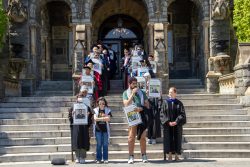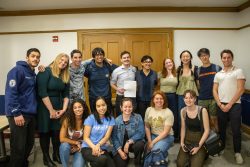The family of a student killed in a physical assault on campus two and a half years ago released yesterday the sanctions imposed on the student found responsible for the assault on their son. Unable to continue their lawsuit and upset by what they consider light sanctions on students who commit serious offenses against other students, they decided to go public with previously unreleased information.
The student found responsible for the physical assault that led to the death of David Shick (MSB ‘01) received a sanction of a 10-page reflection paper and a suspension that never took place, according to documents made public yesterday.
Shick was walking with a small group near the Lauinger Library parking lot on Prospect Street in the early morning hours of Feb. 22, 2000 when he became involved in an altercation with another group of students. At some point during the incident, Shick was knocked to the ground and hit his head on the concrete. He was taken to Georgetown University Medical Center, where he died three days later. Although the D.C. Medical Examiner’s Office ruled on March 3, 2000 that his death was a homicide and not an accident, the U.S. Attorney’s Office never filed charges in the case.
Among the documents released is a July 2000 letter from Assistant Dean of Students Jeanne Lord, informing the “respondent” that the Hearing Board had found him responsible for a physical assault with bodily injury, which is a “Category C”violation, according to University policy. The letter also stated that he had been found responsible for a disorderly conduct, a “Category B” offense, which involves actions or attempted actions that could harm others regardless of intent, and alcohol, a “Category A” offense, which involves use or possession of alcohol.
Lord informed the respondent that he had been sanctioned with conditional suspension for the Fall 2000 semester, a 10-page reflection letter and an alcohol evaluation with Patrick Kilcarr, the director of the Center for Personal Development. In a separate November 2000 letter, following an appeal by the respondent, Assistant Director of the Office of Student Conduct Tiffany Tiffares announced that the University Appeals Board postponed the suspension. The respondent then graduated in May 2002 without having served a suspension.
The Office of Student Conduct oversees all violations of University regulations. According to the Student Handbook, if OSC determines a hearing to be necessary, the case goes before a judicial hearing board, composed of administrators, faculty and students. The board then determines whether the respondent is responsible for a violation of rules and decides appropriate sanctions. A respondent can appeal the outcome of a hearing, and a new hearing board will review the case to determine whether to uphold or amend the original ruling and sanctions.
Following the two hearings involving their son, the University asked Jeff and Debbie Shick, the parents of David Shick, to sign a confidentiality agreement that would prohibit them from disclosing any details concerning the case. The Shicks declined to sign the agreement, and the University never informed the Shicks of the sanctions imposed.
The Family Educational Rights and Privacy Act, a federal law designed to protect the confidentiality of student grades and other educational records, allows universities to legally release the name of the respondent, the violation committed and the resulting sanctions. A university may also disclose the names of the victim and any witnesses involved with their written agreement.
According to the University Student Code of Conduct, Georgetown will only disclose the final results of a student disciplinary hearing if the complainant or alleged victim signs a confidentiality agreement.
“Consistent with our policy, the University has not and will not publicly release information on these proceedings,” Assistant Vice President for Communications Julie Green Bataille said in a University statement. “We continue to believe that maintaining the confidentiality of student code of conduct proceedings and outcomes best serves our educational mission.”
According to Mrs. Shick, the University has not given her family any information.
“It’s legal for them to share, but it’s not their policy,” she said.
After the disciplinary proceedings, the Shicks said that they had hoped to hear the results of the hearings through rumor. As the one-year statute of limitations approached at the end of February 2001, the Shicks decided to file a lawsuit in civil court against the respondent. In a summer 2001 settlement, the respondent provided the Shicks with the documents outlining the sanctions resulting from the initial judicial proceedings as well as the appeal. The two parties also agreed that the Shicks could disclose the information concerning the sanctions provided that they not release the respondent’s name.
“One of the tragic things is that to get any information, we had to file a suit. As parents of the victim, we are not entitled to any information,” Mr. Shick said.
The Shicks also filed a civil suit against the University, which has recently been settled. The Shicks said that they were not satisfied with the settlement with the University, but would not pursue the matter any further with Georgetown due to financial constraints. The Shicks said that they have spent more than $100,000 on the suits.
“At the expressed request of a student and consistent with our policy and FERPA, the University provided Mr. and Mrs. Shick with some otherwise confidential information that pertained to that student. Any limitations on the use of this information are between the Shicks and the student who made it available to them,” Bataille said.
The Shicks decided to release the sanction information after hearing the story of a student raped on campus in the fall of 2001. On April 4, 2002 Kate Dieringer (NUR ‘05) reported to the Office of Student Conduct that she had been raped the previous fall.
According to Curt Martin, Dieringer’s boyfriend and a College of Charleston South Carolina junior, Dieringer’s assailant was found responsible for the rape and expelled from Georgetown. After the assailant appealed the ruling, the sanction was reduced and he was suspended from the University for one year.
As in the Shick’s case, when Dieringer went to Director of Student Conduct Judy Johnson to discover the results of the judicial procedure, Johnson had her sign a confidentiality agreement.
“[Johnson] said, ‘You have to sign this or we are not going to tell you. The law makes it so that we have to be confidential,’” Dieringer said.
Dieringer said she was led to believe that FERPA prohibited the University from releasing the resulting sanctions unless she signed the confidentiality agreement. Dieringer did not learn that it was actually University policy that required the confidentiality agreement until the Shicks contacted her following an article about the rape in The Voice (“The girl who whimpered rape,” Oct. 24, 2002).
Mrs. Shick said that even if they were legally permitted to, she and her husband would not feel the need to publicly release the respondent’s name.
“I think [the settlement with the respondent] speaks for itself. Our lives will never be the same,” she said.
According to sources close to the hearings, the student found responsible for assaulting Shick was a male in the graduating class of 2002. He played on the varsity soccer team for the first three of his four years at Georgetown.
The Voice contacted the student’s family, who declined to comment for the story.
“The [Shick] family has been patient in their dealings with Georgetown. The thing that should have happened all along is finally happening,” said Mike Hiestand, an attorney at the Student Press Law Center.
Mrs. Shick said that she and her husband have no plans to pursue the matter with the University.
“I think the students at Georgetown are very intelligent individuals, and I think they know the difference between what is right and what is wrong,” she said. “It’s your campus.”
The Shicks plan to discuss the issue with their senator, as well as other senators on the Senate Education Committee. They said that their goal is to see FERPA amended to make it illegal for universities not to disclose the results of their disciplinary hearings.
“We want to see [FERPA amended] so that students, if found responsible, will be held publicly responsible,” Mrs. Shick said.
Additional reporting by Kathryn King and Christopher Trott





The gentleman’s name who murdered David Shick by blindsiding him with a punch was Mark Manning of Kingwood, Texas- He played soccer for Georgetown and did not receive any disciplinary action for murdering David. I don’t know why Mark Manning’s name is never mentioned as he committed murder.